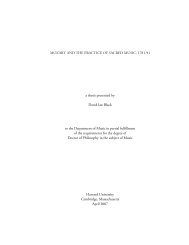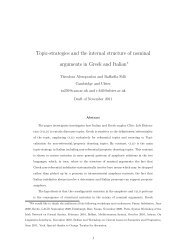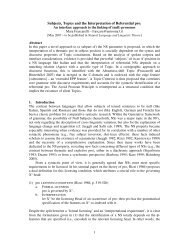Provisional Drogereit pdf
Provisional Drogereit pdf
Provisional Drogereit pdf
Create successful ePaper yourself
Turn your PDF publications into a flip-book with our unique Google optimized e-Paper software.
4. (p. 406) Folk-land yielded income as the land was nationally owned, with no<br />
individual having inalienable right of special usafrucht 157 .<br />
The term Ethel was thus dropped, and in its place the name Family-land appeared,<br />
also not passed on through the sources; it was, however, significant that Lodge made a<br />
clear distinction between two main genres, book-owned land and land owned under<br />
the common law. He had no name for the latter, but held on to his Folk-land term with<br />
ager publicus. Vinogradoff finally did away with this tradition, (which, in our opinion,<br />
had not only scientific research to thank for its origin, but also political thinking).<br />
However, when he drew on Brunner’s research on the Landboc to interpret the<br />
sections that mentioned Folkland, he found that there were only two types of private<br />
ownership, namely:<br />
1. Land that was held under “common law” and was therefore subject to ties,<br />
which tended to allow it to be seen as a family estate i.e. Folk-land<br />
2. Land possessed under book law and thus privileged as a product of Roman<br />
law and religious practice with the decisive characteristic of freedom of disposal.<br />
The competent Court of Justice in such disputes over Folk-land was the Shire gemot,<br />
while for Bocland no appeal was necessary, as the action went straight before the<br />
king 158 .<br />
Folk-land is therefore the undocumented land ownership under common law, with<br />
either limited or no freedom of disposal. To ensure above all that the existing owner<br />
had right of disposal of the land, the book was used to release the land from its<br />
common law ties 159 . – The most common form of privilege (the book) then appeared<br />
as a change from common law land ownership into individual ownership, under the<br />
collaboration of the King and Witan 160 .<br />
With respect to land already registered in the book, the owner – for our consideration<br />
the king, who can even call Bookland his own – can dispose of it without further<br />
authorisation 161 , either via the liber antiquus or by means of a new charter 162 .<br />
157<br />
H. C. Lodge, The Anglo-Saxon Land-Law, in Essays in Anglo-Saxon Law, Boston 1876, p. 57 ff.,<br />
68 ff.<br />
158 P. Vinogradoff, Folkland p. 97 ff. And Buchland (Bocland) I, 168 ff. In particular pp. 177 and 172.<br />
159 P. Vinogradoff, Buchland p. 174.<br />
160 P. Vinogradoff, Folkland p. 105.<br />
161 P. Vinogradoff, Buchland p. 186.<br />
162 H. Brunner, Zur Rechtsgeschichte (Legal History) p. 175 ff.<br />
406
















